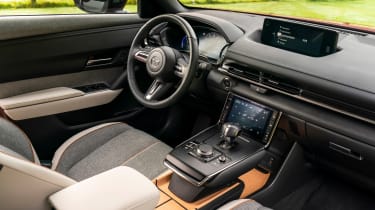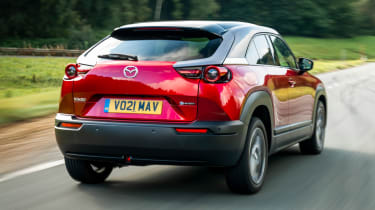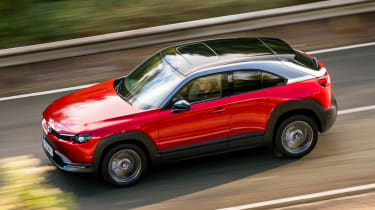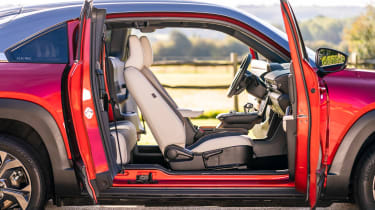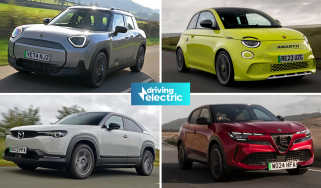Mazda MX-30 electric SUV: prices, specification and range-extender model
Mazda’s first electric car starts at £26,045 after the plug-in grant; plug-in range-extender model with rotary engine to go on sale in 2022
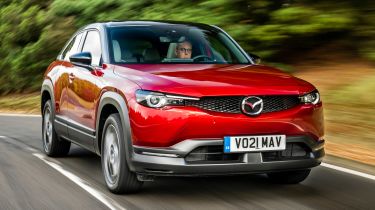
Mazda has confirmed that a plug-in hybrid range-extender version of its MX-30 electric coupe-SUV that uses a rotary engine as a generator will be available in Europe from the first half of 2022.
As this is a range-extender, the rotary engine will be used solely to recharge the MX-30’s battery, rather than drive the wheels. A similar version of the BMW i3 was also available in the electric supermini’s earlier years, with a motorbike engine to top up its battery.
However, other than the initial announcement, Mazda has yet to disclose any further details about the range extender version of the MX-30, such as its pricing and an exact launch date. We’ve also yet to hear anything about the mild-hybrid MX-30’s arrival to the UK (more on that below).
In 2025, Mazda intends to launch a range of electric cars based on a new technical architecture, with the goal of completely electrifying its range by 2030. For the time being, though, the MX-30 remains the brand’s first and only zero-emissions model on sale.
Find out more about the Mazda MX-30 below, or read our full review – including our experience of living with one for several months – here.
Mazda MX-30 equipment, trim levels and prices
The MX-30 is offered in four trim levels: SE-L Lux, Sport Lux, GT Sport Tech and limited-run First Edition. The entry point to the range is priced from £26,045 after the government plug-in car grant and includes 18-inch alloys, LED headlights, front and rear parking sensors, a reversing camera and automatic headlights and wipers.
Inside, there's a seven-inch driver's display, a head-up display and a seven-inch touchscreen for climate control, while Android Auto and Apple CarPlay are also standard, operated on an 8.8-inch infotainment system that also includes sat nav and Bluetooth.
First Edition cars, priced from £27,995 after the grant, build on SE-L Lux specification with a choice of exclusive three-tone paints, adaptive LED headlights, heated front seats with power adjustment for the driver, plus grey cloth and leatherette upholstery.
Sport Lux trim, priced from £27,545, gets unique 18-inch alloys, power-adjustable front seats with lumbar adjustment, keyless entry and a choice of further paint finishes. At the top of the range, the £29,845 GT Sport Tech adds the option of faux-leather upholstery at extra cost, but also gets a front wiperblade de-icer, a sunroof, heated steering wheel and 12-speaker Bose sound system.
Driver assistance and safety
All MX-30 models get a comprehensive list of on-board safety and driver- assistance features as standard. These include driver attention alert, blind-spot monitoring with rear-cross traffic alert, lane-keeping and lane-departure assistance, plus radar cruise control.
Top-spec Sport Lux cars get a 360-degree parking camera, front cross-traffic alert and an extended suite of Mazda's Smart Brake Support system – a form of automatic emergency braking that can operate when it senses a potential collision from the sides, front or rear of the car.
Range, battery and performance
The Mazda has a relatively small 35.5kWh battery that gives a claimed range of around 124 miles. However, thanks to the smaller battery, recharging from a home wallbox takes only around six hours. The MX-30 also gets rapid-charging capability, so a top up from 10-80% capacity takes just half an hour. All MX-30s come with a Type 2 charging cable as standard. The MX-30’s 143bhp electric motor drives the front wheels, providing enough power for a 0-62mph time of 9.7 seconds and a top speed of 87mph.
Hybrid versions
The plug-in hybrid range-extender version of the MX-30 will arrive in the UK in the first half of 2022. This sees the car’s battery twinned with a rotary engine and a small fuel tank to keep it topped up on the move. Elsewhere, a mild-hybrid version of the MX-30 has gone on sale in other markets, but it's unclear if we’ll see this version in the UK. It also combines a rotary engine with a much smaller battery and a larger fuel tank.
The Wankel rotary engine that'll be used in the range-extender and hybrid versions of the MX-30 has something of a cult following, thanks to its radical approach to internal combustion. While most engines use pistons that move up and down, a rotary engine uses triangular-shaped pistons that rotate around a central shaft.
This produces a high power-to-weight ratio, while the compact nature of the engine makes it ideal for use in an electric vehicle, where packaging requirements can put space at a premium. An exact on-sale date and pricing for the forthcoming range-extender MX-30 model have to be announced, but we expect it’ll be slightly more expensive than the pure-electric model.
Design and styling
The MX-30’s design is similar to that of Mazda’s other SUVs, following the language used on the latest CX-5. Mazda says the front face – with its minimalist grille – “bears a friendly expression”, with the look set to be adopted on the latest Mazda3 hatchback, too.
The MX-30 has rear-hinged rear doors, similar to those on the BMW i3. It’s thought that they make the rear seats more accessible, however one drawback is that rear passengers aren't able to get out without the front doors also being opened. The company claims the car's interior design gives occupants a sense of being "enveloped in openness", with materials chosen on the basis of "comfort and eco-friendliness".
The upper section of the car's interior door panel is trimmed in a reprocessed fabric made from recycled plastic bottles, while the 'Premium Vintage Leatherette' seat trim is made using water rather than organic solvents. It features a vintage leather texture printed onto an artificial leather base, then a silicone coating with a precisely controlled surface layer thickness applied. Mazda says this gives the material an appearance of depth and a pleasing tactile quality.
Mazda is keen to draw comparisons between the MX-30 and other MX-badged models from its history – both concepts and production cars. Mazda says that the "MX prefix is given to a car that takes on a challenge to create and deliver new values without being confined by convention, regardless of vehicle type.
Recommended
Most Popular

EV Deal of the Day: budget-friendly Ford Capri for just £234 a month

